八年级下册英语教案Unit3-SectionA-知识精讲
人教版英语八年级下册Unit3 SectionA 教材知识详解

Unit3 SectionA 教材知识详解1. Peter, could you please take out the rubbish? 彼得,请你倒一下垃圾好吗?(1) Could you please...?句意为“你……好吗?”,这是礼貌地提出请求的一种句型。
could不表示过去,而是表示委婉、客气、诚恳的语气,please后应接动词原形。
如:Could you please help me work out the math problem?你能帮我算出这道数学题吗?(2) take out the rubbish意为“倒垃圾”。
take out意为“拿出;取出”,其中out 是副词。
如果表示“把……从……拿出”常用take... out of…。
如:Take the rubbish out when you go out.出去时把垃圾倒掉。
2. sweep the floor 扫地sweep v.扫除;清扫;清除。
其过去式、过去分词均为swept。
如:Could you please help me sweep the floor?你能帮我扫一下地吗?3. make your bed 整理床铺make one’s bed意为“整理床铺”,也可以表达为make the bed。
如:I could make my bed when I was very young.我很小的时候就能整理床铺。
4. Sorry. I’m going to work on it now.对不起。
我现在就要用它工作。
work on是一个动词短语,on为介词,表示“从事某项工作;做某项工作/研究;创作作品、作画、开机器等”。
如:My father is an author. He is working on a new novel.我爸爸是一位作家。
他正在写一部新小说.(1) work hard at意为“努力学习,努力做”。
(完整版)英语人教版八年级下册Unit3教学设计

(完整版)英语人教版八年级下册Unit3教学设计课题:Unit 3 Could you please clean your room?Period 1 (Section A 1a-1c)学习目标【Learning objectives】1.掌握单词: rubbish, fold, sweep, floor, take out the rubbish.2.学会礼貌地提出请求并熟练练习对话。
重点和难点【Important and difficult points】教学重点:能熟练拼读单词及短语rubbish, fold, sweep, floor, take out the rubbish.教学难点:学会用句型“Could you please…”来礼貌地提出请求。
预习内容【prepare lessons before class】1.要求学生掌握单词rubbish, fold, sweep, floor, take out the rubbish并指导学生找出家务活的表达方式。
2. 指导学生用“Could you please…”造句。
学习过程【Learning process】一、预习反馈,明确目标【Preview feedback, Clear objective】1.本节课的单词你有更多的是积累吗?2.写出更多家务琐事的表达方式:3.你知道怎样礼貌地提出请求吗?二、创设情境,自主探究【Create situations, Self inquiry】1. T: 1) Do you help to do any chores at home ?2) What work do you usually do to help your parents?3) Which one are you good at?Ss: Discuss the teacher’s questions with their partners.2. Check(√) the chores you can do in 1a and add more chores.三、展示交流,点拨提升【Display communication, Coaching to enhance】1. T: 1. Who are the two people in the picture? Why do yousay so?2. Where are they? How do you know?2. Read the chores and add more chores.3. Use “Could you please…” to make a conversation just like Peter and his mother. 1c.4. Listen to 1b and check their answers.四、师生互动,拓展延伸【Teacher-student interaction, Development】【归纳】Make polite requests. ------ Could you please…? Yes, sure./ OK, but……【拓展】1.Can you do some dishes?2. rubbish的同义词:eg. You do talk rubbish sometimes. 胡言乱语【辨析】1. do 与make2. clean 与sweepeg. Let’s clean the house. You sweep the floor and I wash the dishes.五、达标测评, 巩固提高【Evaluation standards,Consolidation and improvement】基础题I. 根据句意及首字母提示写出单词。
英语:Unit 3教案(人教新目标八年级下)
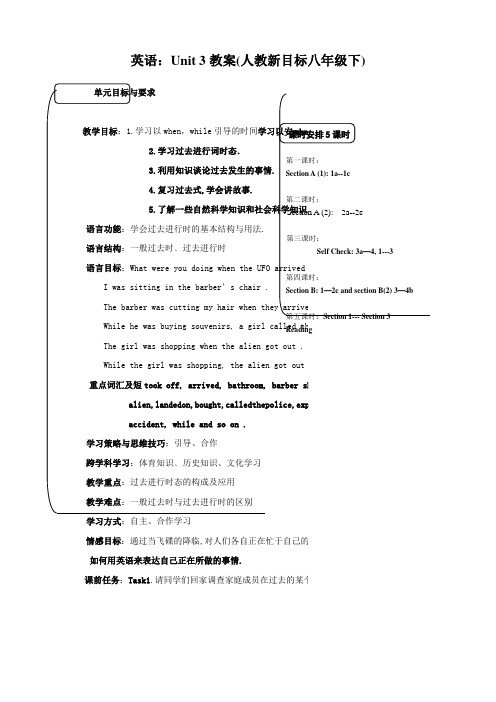
英语:Unit 3教案(人教新目标八年级下)学习方式:自主、合作学习情感目标:通过当飞碟的降临,对人们各自正在忙于自己的事如何用英语来表达自己正在所做的事情.课前任务:Task1.请同学们回家调查家庭成员在过去的某个时第一课时教学内容与分析教学内容:Section A (1): 1a---1c教学目标:1.能够掌握基本单词和词汇。
2.学会过去进行时的基本结构与用法。
3.能够运用以when 引导的时间状语从句。
4.能够运用基本句型进行提问。
学习任务:我的爱好目的:通过学生小组活动,调查在过去的不同时间里做不同的事情,学会使用过去进行时态,培养学生应用英语进行交际的能力。
语言技能:Listening .Speaking .Reading ﹑Writing语言知识:过去进行时的用法及复习一般过去时态提示词语及句型:got out, cut, barber shop, bathroom, kitchen, well, bathroomWhat were you doing when the UFO arrived ?I was sitting in the barber’s chair .The barber was cuttingmyhair when they arrived .教学重点、难点分析:教学重点:基本单词,词汇和句型教学难点:能够运用过去进行时谈论人们所做的事情.课前准备1.本课时的教学课件2.课前发给学生表格向学生布置任务:在表格中写出有关内容。
教学设计教学步骤建议和说明Teaching Steps :Step 1 :Warm-up and revision1.Share an English song .2.Greetings and free-talk .从平常的谈话中轻松导入本课句型,信息沟通使谈话非常真实,而又浅显What are you doing ? What did you do last night ?3.Show slides: Revise: is/an/are +动词ing4.Brain storm:Collect the names of activities which said by the students.Step 2 :Presentation :1.Watch a video2.By asking: What’s this in English ?Have you even seen it ?3.Teach:UFO, bedroom, bathroom, bedroom, kitchen,living-room, barber shopStep 3 :Work on:SB Page 18 , 1a .1.Point to the sentences .Read the sentences .Explain what each one means.2.Teach :barber shop, well, bathroom, bedroom, kitchen, get out, cut3.Look at the picture.. Point out the six people. Match the statements with the people in the picture4.Check the answers .5.Practice reading .Step 4 :Work on:SB Page 18 , 1b .1. Read the instructions .Make sure the Ss understand whatthey should do .2. Look at the dialogue in the picture .Explain :过去进行时态的构成: was / were + doing .用法:表示过去某一时刻或某一段时间正在进行的动作,一般用时间状语来表示。
人教版八年级下册英语教案(全册)
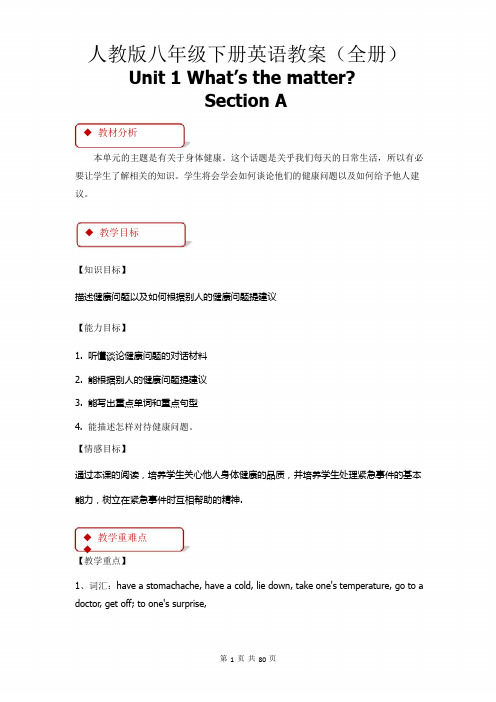
人教版八年级下册英语教案(全册)Unit1What’s the matter?Section A◆教材分析本单元的主题是有关于身体健康。
这个话题是关乎我们每天的日常生活,所以有必要让学生了解相关的知识。
学生将会学会如何谈论他们的健康问题以及如何给予他人建议。
◆教学目标【知识目标】描述健康问题以及如何根据别人的健康问题提建议【能力目标】1.听懂谈论健康问题的对话材料2.能根据别人的健康问题提建议3.能写出重点单词和重点句型4.能描述怎样对待健康问题。
【情感目标】通过本课的阅读,培养学生关心他人身体健康的品质,并培养学生处理紧急事件的基本能力,树立在紧急事件时互相帮助的精神.◆教学重难点◆【教学重点】1、词汇:have a stomachache,have a cold,lie down,take one's temperature,go to a doctor,get off;to one's surprise,2、句型:1.——What's the matter?——I have a stomachache.You shouldn't eat so much next time.2.——What's the matter with Ben?——He hurt himself.He has a sore back.——He should lie down and rest.【教学难点】掌握情态动词should shouldn't.的用法;学习have的用法◆课前准备◆Multimedia,group work,cooperative discussion.◆教学过程Step1.Warm up1.Look at the picture and learn the parts of the body.2.New words and phrases.Step2Presentation1.1aLook at the picture.Write the correct letter[a-m]for each part of the body.Then check the answers.2.1bFirst,lead Ss to read the five names.Then look at the picture.Number the names1-5.’sFinally, check the answers.3. 1cDivide two Ss into a pair to make conversations. Finally, invite several pairs to act outfor the class.Step 3 Practice1. 2aTell Ss there are five conversations. In each conversation the person says what goingon with them. Listen carefully and number the pictures.Play the tape. Then check the answers.2. 2bAsk Ss to listen to the recording again to match the problems with the advice.Play the recording again. Then check the answers.3. 2cAsk Ss to make conversations using the information in 2a and2b. Give them enoughtime to do this task. Later , invite several pairs to present their conversations to theclass.Step 4 Consolidation1. 2dFirst, ask Ss to have a fast reading of the conversation to get the main idea.Then, lead Ss to read the conversation sentence by sentence, explain some languagepoints.Finally, divide Ss into pairs to practice role-playing the conversation.2. 3aFirst, read the passage quickly and answer the question.Then,lead Ss to read the passage and analyse the key points.Finally,read together.3.3bRead the passage again and check the things that happened in the story3cDiscuss the questions with a partner.4.Grammar focusFirst,lead Ss to read the sentences.Then,prompt Ss to analyse the use of model verb should.After that,explain the grammar together.5.4aAsk Ss to fill in the blanks.Then,invite some Ss to present their answers.6.4bAsk Ss to circle the best advice for these health problems,then add their own advice.After that,invite some Ss to present their advice.7.4cOne student mimes a problem.The other students in your group guess the problem and give advice.Step5Language pointsStep6HomeworkMake a conversation about health problems and giving advice.Unit1What’s the matter?Section B◆教材分析本单元的主题是有关于身体健康。
人教版八年级下册英语Unit3SectionA3a—3c教学设计

2.小组内用英文进行讨论,每位成员介绍自己的兴趣爱好,并运用所学形容词和句型进行描述。
3.各小组向全班展示讨论成果,其他小组进行评价和反馈。
(四)课堂练习(500字)
1.教师设计听力练习,让学生听懂并获取关于兴趣爱好的一段对话,提高听力水平。
(3)口语表达的流畅性:学生能够在实际交流中,克服紧张情绪,运用所学知识进行流畅表达。
(二)教学设想
1.采用任务型教学法,设计丰富多样的教学活动,激发学生的学习兴趣,引导学生主动参与课堂。
2.创设真实语境,让学生在实际场景中进行听力训练,提高听力技巧。
3.结合小组合作学习,鼓励学生相互交流、讨论,培养口语表达能力,同时加强生生之间的互动。
2.学习3a部分的句型,如“Do you like...?”, “I don't like.பைடு நூலகம்.”和“I find...interesting/funny...”,让学生模仿、朗读,并进行角色扮演练习。
3.通过听力练习,让学生听懂并准确获取关于他人兴趣爱好的信息,提高听力技巧。
(三)学生小组讨论(500字)
三、教学重难点和教学设想
(一)教学重难点
1.重点:
(1)词汇:学生能够熟练掌握表示喜好和厌恶的形容词,如interesting, boring, exciting, funny等。
(2)句型:学生能够运用一般现在时描述自己的兴趣爱好,如“I like reading books.”,并掌握相关疑问句型“Do you like...?”。
2.学生在听力方面,对于日常生活中的兴趣爱好话题,能够听懂并获取相关信息,但面对稍复杂的语境,部分学生仍存在一定的困难。
人教版八年级下册英语Unit3SectionA教学课件[1].ppt
![人教版八年级下册英语Unit3SectionA教学课件[1].ppt](https://img.taocdn.com/s3/m/42482661783e0912a2162a63.png)
What were you doing when the teacher came in?
A: What were you doing when the teacher came in? B: 1. I was opening the window. 2. I was cleaning the window. 3. I was talking. 4. I was reading. A: What was Junding doing when the teacher came in? B:1. He was opening the window. 2. He was cleaning the window. 3. He was talking. 4. He was reading.
What were you doing when the UFO arrived?
What were you doing when the UFO arrived?
What were you doing when the UFO arrived?
What were you doing when the UFO arrived?
Report (revision of last unit)
1. Talk about problems 2. Give advice with should / could
bathroom
barber shop barber cut kitchen
bedroom.
Unit 3 What were you doing when the UFO arrive?
Homework
1. Remember the new words.
2. Make six sentences with “was / were + V-ing” eg: I was reading when the teacher asked me.
人教版八年级下册英语Unit3_Section A 第1课时(1a~2d)教案与反思

大地二中张清泉Section A 单词rubbish n.垃圾;废弃物 fold v.折叠;对折 sweep v.(swept)扫;打扫floor n.地板 mess n.杂乱;不整洁 throw v.(threw)扔;掷neither adv.也不; pron.两者都不 shirt n.衬衫 pass v.给;递;走过;通过borrow v.借;借用 lend v.(lent)借给;借出 finger n.手指hate v.厌恶;讨厌while conj.与……同时;当……的时候;而;然而chore n.杂务;乏味无聊的工作 snack n.点心;小吃;快餐短语take out the rubbish 倒垃圾 all the time频繁;反复as soon as 一……就……句型1.Peter,could you please take out the rubbish? 彼得,你能把垃圾倒了吗?2.And she won’t be happy if she sees this mess.而且如果她看到这么乱,她会不高兴的。
3.Could I at least finish watching this show?至少等我看完这个节目可以吗?4.For one week, she did not do any housework and neither did I.在—周时间里,她没有做任何家务,我也没有做。
5.I’ll finish my homework while you help me with the dishes.当你帮我洗碗的时候,我会完成家庭作业。
Section B单词stress n.精神压力;心理负担waste n.浪费;垃圾 v.浪费;滥用provide v.提供;供应anyway adv.而且;加之depend v.依靠;信赖develop v.发展;壮大fairness n.公正性;合理性since conj.因为;既然 prep.,conj.& adv.从……以后;自……以来neighbor(=neighbour) n.邻居ill adj.有病;不舒服drop v.落下;掉下fair adj.理的;公正的unfair adj.不合理的;不公正的snack n.点心;小吃;快餐independence n.独立independent adj.独立的;自主的短语in order to目的是;为了 depend on 依靠;信赖a waste of time浪费时间 take care of 照顾;处理句型1.Could I invite my friends to a party? 我能邀请我的朋友们参加聚会吗?2.They should spend theirtime on schoolwork in order to get good gradesand get into a good university.为了取得好成绩并考入一所好大学,他们应该把时间花在学业上。
Unit3SectionA3a-3c教案人教版八年级英语下册

环节一:Prelistening1教师活动1T introduces the background of this class. Peter’s classmate Nancy is talking with his brother Tony about doing chores. What may happen during their talk? 学生活动 1Ss read the background of the lesson活动意图说明:通过设置背景,让本节课生动鲜活地和学生的生活实际联系到一起,激发学习兴趣。
环节二:listening 1教师活动2Step 2T asks Ss to listen and answer the following questions.1.What does his sister want Tony to do?2.What does Tony want to do first?3.Where do you think their mother is? 学生活动 2Ss look at the picture and guess the possible relationship between the two children .Ss then listen to the conversation and answer the following questions.活动意图说明:通过插图激发学生关注听力内容,通过回答问题串帮助学生理清Nancy对于做家务的看法,为后文的讨论埋下伏笔。
环节三:listening 2教师活动3Step 3T asks Ss to listen again. Fill in the blanks. After that, try to retell it and guess what will happen next. 学生活动 3Ss listen and fill in the blanks and then guess what will happen next.活动意图说明通过排序引导学生复述文本,熟悉对话,同时通过合理预测引出阅读文章内容。
人教版英语八年级下册 Unit3_SectionA(1a-2d)教案
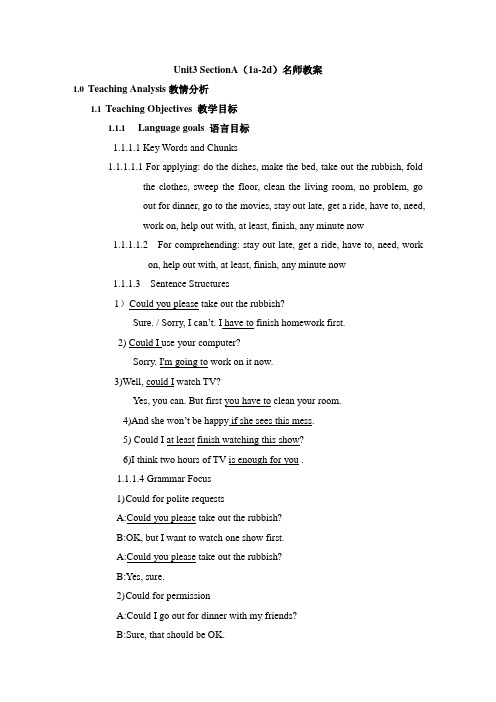
Unit3 SectionA(1a-2d)名师教案1.0Teaching Analysis教情分析1.1Teaching Objectives 教学目标1.1.1Language goals 语言目标1.1.1.1 Key Words and Chunks1.1.1.1.1 For applying: do the dishes, make the bed, take out the rubbish, foldthe clothes, sweep the floor, clean the living room, no problem, goout for dinner, go to the movies, stay out late, get a ride, have to, need,work on, help out with, at least, finish, any minute now1.1.1.1.2 For comprehending: stay out late, get a ride, have to, need, workon, help out with, at least, finish, any minute now1.1.1.3 Sentence Structures1)Could you please take out the rubbish?Sure. / Sorry, I can’t. I have to finish homework first.2) Could I use your computer?Sorry. I'm going to work on it now.3)Well, could I watch TV?Yes, you can. But first you have to clean your room.4)A nd she won’t be happy if she sees this mess.5) Could I at least finish watching this show?6)I think two hours of TV is enough for you .1.1.1.4Grammar Focus1)C ould for polite requestsA:Could you please take out the rubbish?B:OK, but I want to watch one show first.A:Could you please take out the rubbish?B:Yes, sure.2)C ould for permissionA:Could I go out for dinner with my friends?B:Sure, that should be OK.A:Could you get something to drink after the movie?B:No, you can’t. You have a basketball game to morrow.1.1.2Ability goals 能力目标1.1.2.1 教会学生用could礼貌地提出要求和征求许可。
Unit3SectionA重要知识点讲解与练习课件人教版八年级英语下册
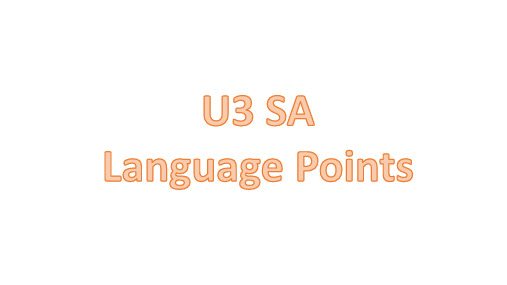
______ I.(我也没做)
neither did
as soon as& the minute
1. The dog ran to the dining hall as soon as the bell rang.
T__h_e__m__in_u__te_ the bell rang,the dog ran to the dining hall.
A. Neither I did B. Neither did I
C. So I did
D. So did I
9. N__e_i_th__er__o_f us(我倆都没有) borrowed shirts from Mike.
10. Tom didn't do any homework for a week and ________
⑵“neither+c.n单” 作主语时,谓V常用单数
Neither__sh__ir_t___ (shirt) is clean(adj)=
Neither of the shirts __is____ (be) clean.
⑶“neither of+c.n复”作主语时,谓v常用单数 Both of them come from China. (否定句) _______ _____
— No problem. / All right.
Sorry/No, you can’t. …
Neither
⑴ 可以单独用作答语,回答对方的建议 — Would you like some tea or coffee? —① Neither, I just want a glass of water. ② Both, I like them very much.
英语人教版八年级下册Unit 3 Section A 1a-2d 教学设计

新目标八年级下册Unit 3 Could you please clean the room?Section A 1a-2d石家庄第二外国语学校周洁1.教材分析人民教育出版社《Go For It》教材不仅帮助学生学习英语语言知识,同时帮助学生发展语言运用能力,学会用英语表达思想,与人交流,用所学知识来解决问题。
各个单元以不同主题为线索,为学生设计了许多贴近生活、具有交际意义的任务或活动,以此激发学生英语学习的热情,使学生在较为真实的情境中感知语言,应用语言,参与课堂。
Unit3 Could you please clean your room? 以“家务和许可”为主题,以主动帮助家人做家务的实例,引导学生强化劳动观念,学会照顾自己,培养自身独立意识。
2.学情分析在学校分层小班教学的背景下,所教授的小班为A班,学生英语基础相对薄弱,需要夯实基础,稳扎稳打;他们有着极强的表现欲,需要在课堂训练中有更多机会展现自我;他们在英语学习上欠缺自信,需要得到教师的肯定以及自我认同;个别同学欠缺英语学习热情,需要在生动活泼的课堂中感受快乐。
3.教学目标语言知识(Language knowledge)(1)围绕本单元话题,学会准确地读出和使用rubbish, fold, sweep, floor, throw, borrow, lend,chore等词语。
(2)准确把握情态动词could的用法,能够礼貌地向他人用“Could you please…?”提出要求,用“Could I…?”请求许可,并对二者礼貌应答。
语言技能(Language skills)能够熟练应用“Could you please…?”提出要求,应用“Could I…?”请求许可,并能够礼貌回应他人的要求及请求;通过听力和阅读,获取所需细节信息;通过小组合作的方式,对提出要求和请求许可进行巩固训练,实现礼貌而顺畅的沟通。
学习策略(Learning strategies)养成自主预习,自主探究,合作互助的学习习惯;通过提前预览,预测听力所填内容;通过自主感知英语语言,总结规律,并加以应用。
Unit3SectionA1a-2c(教学设计)2023-2024学年人教版八年级英语下册

1.软硬件资源:多媒体教室、投影仪、计算机、音响设备、白板、教学挂图、节日相关物品(如感恩节火鸡、圣诞节装饰品等)。
2.课程平台:人教版八年级英语下册教材、教学课件、听力材料、在线词典、相关节日文化背景资料。
3.信息化资源:互联网、在线教育平台、社交媒体(如微博、微信等)、学习管理系统(如Moodle、Blackboard等)。
3.答案:C
解析:选项C的句子表达方式是正确的。选项A的句子中,“celebrating Thanksgiving with my family”应改为“having a Thanksgiving dinner with my family”;选项B的句子中,“a small turkey”应改为“a small turkey dinner”;选项D的句子中,“Christmas is the most important festival in China”应改为“Christmas is one of the most important festivals in China”。
提出问题,检查学生对旧知的掌握情况,为本节课新课学习打下基础。
(三)新课呈现(预计用时:25分钟)
知识讲解:
清晰、准确地讲解1a-2c节的知识点,结合实例帮助学生理解。
突出节日文化重点,强调文化差异难点,通过对比、归纳等方法帮助学生加深记忆。
互动探究:
设计小组讨论环节,让学生围绕节日文化习俗展开讨论,培养学生的合作精神和沟通能力。
(3)The Spring Festival is the most important traditional Chinese festival, also known as the Chinese New Year.
人教版英语八年级下册Unit3教材解读(英语教案)
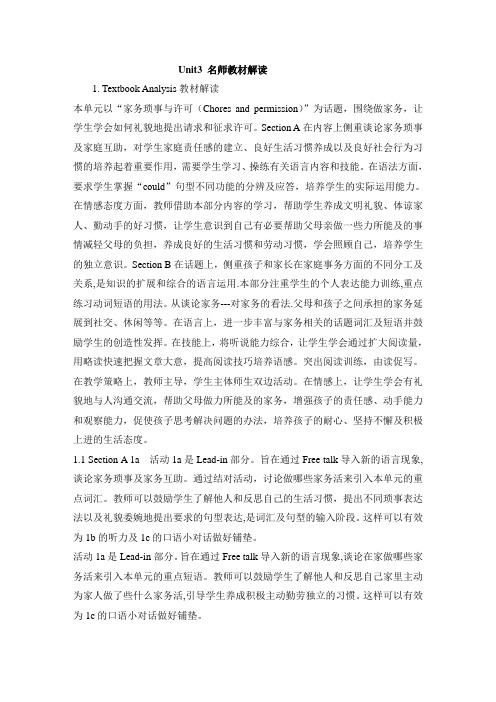
Unit3 名师教材解读1. Textbook Analysis教材解读本单元以“家务琐事与许可(Chores and permission)”为话题,围绕做家务,让学生学会如何礼貌地提出请求和征求许可。
Section A在内容上侧重谈论家务琐事及家庭互助,对学生家庭责任感的建立、良好生活习惯养成以及良好社会行为习惯的培养起着重要作用,需要学生学习、操练有关语言内容和技能。
在语法方面,要求学生掌握“could”句型不同功能的分辨及应答,培养学生的实际运用能力。
在情感态度方面,教师借助本部分内容的学习,帮助学生养成文明礼貌、体谅家人、勤动手的好习惯,让学生意识到自己有必要帮助父母亲做一些力所能及的事情减轻父母的负担,养成良好的生活习惯和劳动习惯,学会照顾自己,培养学生的独立意识。
Section B在话题上,侧重孩子和家长在家庭事务方面的不同分工及关系,是知识的扩展和综合的语言运用.本部分注重学生的个人表达能力训练,重点练习动词短语的用法。
从谈论家务---对家务的看法.父母和孩子之间承担的家务延展到社交、休闲等等。
在语言上,进一步丰富与家务相关的话题词汇及短语并鼓励学生的创造性发挥。
在技能上,将听说能力综合,让学生学会通过扩大阅读量,用略读快速把握文章大意,提高阅读技巧培养语感。
突出阅读训练,由读促写。
在教学策略上,教师主导,学生主体师生双边活动。
在情感上,让学生学会有礼貌地与人沟通交流,帮助父母做力所能及的家务,增强孩子的责任感、动手能力和观察能力,促使孩子思考解决问题的办法,培养孩子的耐心、坚持不懈及积极上进的生活态度。
1.1 Section A 1a 活动1a是Lead-in部分。
旨在通过Free talk导入新的语言现象,谈论家务琐事及家务互助。
通过结对活动,讨论做哪些家务活来引入本单元的重点词汇。
教师可以鼓励学生了解他人和反思自己的生活习惯,提出不同琐事表达法以及礼貌委婉地提出要求的句型表达,是词汇及句型的输入阶段。
新八下unit3 sectionA知识点

(b)表示“令人惊讶的事务/意外之事”时,是可数
名词。 I have a surprise for you。 我有一个意外的消息要告诉你。 (2). surprise还可以做及物动词,意思是“使惊讶; 使惊奇”。常用短语:surprise sb His success surprised everyone.他的成功使大家 很惊讶。 The news will surprised her. 这个消息会让她很惊讶。 8.My mom came over as soon as I sat down in front of the TV.我一在电视剧前坐下,我妈妈就 过来了。
7.“What happened?” she asked in surprise. 发生了什么事?她惊讶地问。 (1)surprise可做名词,基本用法如下: (a)表示“惊讶”时,是不可数名词。 常用短语:in surprise 惊讶地;to one„s surprise 让某人惊讶的是. She looked at me in surprise. 她惊奇的看着我。 He looked up in surprise when I shouted当我叫喊 时,他惊讶的往上看。 To my surprise, there is 50,000yuan in the paper bag. 令我吃惊的是纸袋里有50,000元。
---Would you like the red shirt or the black one? 你想要红色的衬衫还是黑色的衬衫? ---Neither, I‟d like the white one.两件都不要,我 要白色的那件。 (3)Neither adj.“(两者)都不的”,与名词单数连 用。 Neither answer is right.两个答案都不对。 (4)neither…nor…意为“既不……也不……”。 The room is neither big nor bright. 这个房间既不大也不明亮。 Neither you nor I am right./ Neither I nor you are right.你不对,我也不对。
八年级Unit3SectionA(1a-1c)说课稿

Unit 3 Could you please clean your room?Section A (1a1c)说课稿一、设计思路1、指导思想本节课选自新目标Go for it!人教版八年级英语下册第三单元的第一课时,本节内容是围绕“chores”这一话题展开,语言技能和语言知识都是依据这一中心话题而设计的。
重点在于通过听说来学习如何礼貌地提出请求和征求别人的许可,激发学生的兴趣,培养学生分担家务的习惯。
《英语课程标准》强调英语课程要从学生的学习兴趣,生活经验和认知水平出发,倡导体验、实践、参与、合作与交流的学习方式和任务型的教学途径,发展学生的综合英语运用能力。
基于课程标准的要求及学生的心理特点和认知发展规律,我设计了flash动画导入,情景会话,表演,个人点评等多种教学活动和方式来调动学生的学习兴趣;在教学策略方面采用了情境视听法、小组合作学习、任务型教学法,为学生设置真实的情景、语境,使学生在思考、交流、合作探究中学习和使用语言。
2、设计理念本节课在选材方面围绕“chores”的话题切入,非常贴近学生生活,有利于激起学生的英语学习热情。
体现了“从生活走向英语”的理念,运用flash动画、图片、声音媒体等手段教学,设置练习和实践所需的真实场景,营造良好的语言学习情景。
让学生感知英语的语言应用就在生活中。
引导学生透过对话练习,有效地培养了学生的英语语言技能,通过情感态度的培养,学生学会爱父母,爱家庭,爱劳动,学会如何与人交往,使他们的个性得到张扬。
3、教材分析本节课是新目go for it人教版八年级英语下册第三单元的第一课时。
本节课的中心话题是如何礼貌的请求对方做家务,通过谈论做家务,体会劳动的不易,培养做家务的习惯。
这一话题非常贴近学生生活实际,易于引发学生用英语进行交流。
学生通过对单词、短语、句型的学习以及对课件的观察和模仿,在实际操练中进一步提高了听力理解和综合运用语言的能力,且通过本节课的学习进一步培养了学生的合作意识、劳动意识,帮助学生学会关心他人,为父母分担家务的习惯。
Unit3SectionA1a-2c(教学设计)人教版八年级英语下册

课题Unit 3 Could you please clean your room. Section A 1a2c教学目标:根据以上我对本单元教材内容的分析,我确定以下几个为本单元的教学目标:语言知识、语言技能、学习策略、情感态度和文化意识五个方面。
1.语言知识:本单元要求学生掌握以下词汇(do the dishes, sweep the floor, take out the trash. fold your clothes, clean the living room, do chores, have to do sth, like to do (doing) sth, make dinner, make your bed)语言功能:学习在情景交际中提高对话的能力,做到知识与生活实践相结合。
语言结构:Could you please clean your room?Yes, sure.Could you please do the dishes?Sorry, I can’t. I have to do my homework.2.语言技能:1)学习一些常用的动词短语。
2)委婉地提出请求、征求许可做某事。
Could you/I please do things?Yes, Sure. / 。
I/You can. Sorry, I / you can’t,.., I / you have to do...”3、学习策略:通过本单元的教学,学生能通过小组合作来展示自己的对话能力,并可以培养学生团结协作的意识,并让学生学会认真倾听别人对话的能力。
4、情感态度:通过对本单元的任务性活动,我的目的是让学生们培养自己良好的生活习惯以及自理能力,同时能提高他们在家庭以及学校中的责任意识,激发他们对学习英语的兴趣和热情,在接近生活常态的交际中能乐于模仿,敢于开口,积极参与,主动请教。
5、文化意识:在实际的生活中委婉地表达自己的请求和征求许可。
人教版英语八年级下册Unit3SectionA(1a1c)教学设计

一、教学目标
(一)知识与技能
1.掌握本节课的核心词汇和短语,如:attraction, exciting, loud, crowd, everywhere, reasonable, as well as等,并能熟练运用这些词汇进行口语交流。
3.阅读作业:推荐学生阅读一篇关于旅游的英语文章,要求学生在阅读过程中关注一般过去时态的运用,并总结文章中出现的新词汇和短语。阅读后,学生需完成相关阅读理解练习,检验自己的阅读效果。
4.复习作业:请学生复习本节课所学的词汇、短语和一般过去时态的用法,准备下一节课的课堂小测验。教师将针对本节课的重点内容进行检测,以了解学生对知识的掌握情况。
难点:对于一般过去时态的准确运用,以及如何将所学词汇和句型灵活运用到实际语境中。
2.重点:培养学生听力理解能力,使学生能够通过听课文录音,获取关键信息,并进行相应的口头回答。
难点:提高学生在听力过程中的信息捕捉能力和快速反应能力。
3.重点:通过小组合作、讨论和分享,培养学生的合作意识和口语表达能力。
3.教学反馈:教师邀请各小组代表汇报讨论成果,对学生的表现给予积极的评价和鼓励。
(四)课堂练习
1.教学内:设计听力练习和口语练习,巩固所学知识。
2.教学实施:听力练习:播放课文录音,让学生回答相关问题,检查对课文内容的理解。口语练习:学生两人一组,进行角色扮演,模拟旅游场景,用一般过去时态进行对话。
3.教学策略:
a)关注学生个体差异,因材施教,使每个学生都能在课堂上得到有效的提升。
b)利用多媒体教学资源,丰富教学手段,提高学生的学习兴趣。
c)适时给予学生反馈,指导学生总结经验,提高学习效果。
英语人教版八年级下册Unit3 SectionA 1a_2d
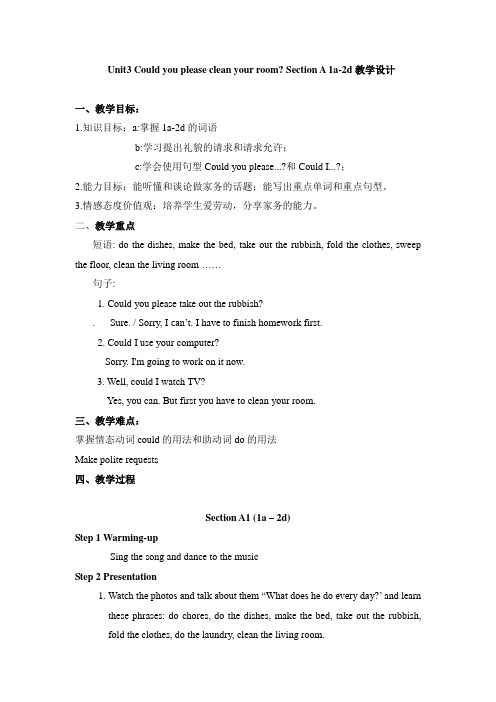
Unit3 Could you please clean your room? Section A 1a-2d教学设计一、教学目标:1.知识目标:a:掌握1a-2d的词语b:学习提出礼貌的请求和请求允许;c:学会使用句型Could you please...?和Could I...?;2.能力目标:能听懂和谈论做家务的话题;能写出重点单词和重点句型。
3.情感态度价值观:培养学生爱劳动,分享家务的能力。
二、教学重点短语: do the dishes, make the bed, take out the rubbish, fold the clothes, sweep the floor, clean the living room ……句子:1. Could you please take out the rubbish?. Sure. / Sorry, I can’t. I have to finish homework first.2. Could I use your computer?Sorry. I'm going to work on it now.3. Well, could I watch TV?Yes, you can. But first you have to clean your room.三、教学难点:掌握情态动词could的用法和助动词do的用法Make polite requests四、教学过程Section A1 (1a – 2d)Step 1 Warming-upSing the song and dance to the musicStep 2 Presentation1. W atch the photos and talk about them “W hat does he do every day?’ and learnthese phrases: do chores, do the dishes, make the bed, take out the rubbish, fold the clothes, do the laundry, clean the living room.2. Look these phrases and practice the conversation: Could you please take outthe rubbish? Sure. / Sorry, I can’t. I have to finish homework first.3. 1a Do you do these chores at home? Discuss them with your partner.Step 3 Listening1b Listen. Who will do these chores? Check (√) Peter’s mother or Peter.Step 4 Practice1c Make conversations about the chores in 1a.Make conversations.ExamplesA: Could you please...?B: Yes, sure. /All right. /No problem./Certainly.Sorry, I can't. I have to do...Sorry, I can't. I am doing...Step 5 Listening 2a&2bPeter asks his father if he can do four things. What does his father say? Check (√) “yes” or “no”. Listen again. Draw lines to the reasons.Step 6 Practice2c Make conversations using the information in 2a and 2bA: Could I use your computer?B: Sorry. I’m going to work on it now.A: Well, could I watch TV?B: Yes, you can. But first you have to clean your room?2d Role –play the conversationStep 7 Language points and summary1. Tony, could you please help out with a few things?help out 动词短语,表示在某人繁忙或遇到困难时“给予帮助”。
八年级英语下册:Unit 3 Section A1a-2d8优秀教学教案说课稿

错误!未指定书签。
单元目标知识目标Section A重点单词rubbih,fod,weee bac before nine语法目标让学生掌握情态动词coud的用法技能目标让学生学会有礼貌地提出请求,征求许可及回答写作目标让学生学会写关于做家务的短文情感目标让学生学会有礼貌地提出请求并对别人的请求做出回答;培养学生帮助他人、热爱劳动的意识第一课时Section A1a-2d错误!未指定书签。
课时目标重点单词rubbih n.垃圾;废弃物fod v.折叠;对折weeS1:T:Oh,ou often do chore on chore do ou do on weeend教师在提问时应用夸张的语调来强调chore这一单词,并把chore写到黑板上,然后用图片帮助学生作出回答。
S2:do the dihetae out the rubbihfod the cotheweeae the bedcean the iving room设计意图:以对话和图片的形式,激发学生的好奇心和参与的积极性。
环节2学习1a-1c1.让学生分角色表演第17页上图片中的对话。
2.让学生浏览1a中的短语,理解每个短语的意思,然后和同桌讨论在家做家务的情况。
3.让学生浏览1b的表格,为听力做准备。
4.教师播放1b的录音,学生在表格对应的人物下面打勾,教师核对答案。
5.让学生大声朗读1c中的对话,并让学生两人一组,利用1a中的短语,仿照该对话来编新的对话。
6.教师邀请2至3组学生当堂表演对话。
设计意图:让学生通过听力练习和对话演练,培养他们运用目标语言进行日常交际的能力。
环节3学习2a-2d1.让学生先浏览2a的表格,了解听力内容,然后教师播放2a的录音,让学生完成2a的练习。
2.教师再次播放录音,让学生找出彼得父亲反对的理由,并在2a的框中把理由勾画出来。
3.让学生再来听录音,教师核对2a和2b的答案。
4.让学生大声朗读2c的对话,然后两人一组,根据听力材料的内容仿照该对话编新的对话。
- 1、下载文档前请自行甄别文档内容的完整性,平台不提供额外的编辑、内容补充、找答案等附加服务。
- 2、"仅部分预览"的文档,不可在线预览部分如存在完整性等问题,可反馈申请退款(可完整预览的文档不适用该条件!)。
- 3、如文档侵犯您的权益,请联系客服反馈,我们会尽快为您处理(人工客服工作时间:9:00-18:30)。
人教版八年级英语Unit3 SectionA重难点讲解1.Peter ,could you please take out the trash? 彼得,你能把垃圾倒了吗?【解析1】Could you please do sth ?请你(做)......好吗?用于提出请求,希望得到对方的肯定回答,说话的语气比较客气委婉。
Could 不是can的过去式,是委婉、礼貌的说法。
回答用can.【常用答语】肯定回答:Sure./ Of course./ Certainly./No problem.否定回答:Sorry , I can’t【2013 黄冈3】40.—Could I borrow your camera?— ___________,but please give it back by Saturday.A. I am sorryB. Of courseC. Certainly notD. No, thanks【2013呼和浩特】Tom , would you please ___ the box? It’s fo r your sister.A. not openB. don’t openC. not to openD. to not open【解析2】take out 取出(v+ adv)【注】: 跟代词做宾语,代词放中间;跟名词做宾语,可放在中间,也可放在后边()His teeth hurt badly. The dentist ______.A .take out it B. take out them C. take it out D .take them out【短语】take out the trash 倒垃圾 take a walk 散步 take away 拿走,取走take back 收回 take place 发生 take off 脱下;起飞The gift is in the box. You can take it out.【2013】6. You had better hurry or we’ll be late for the plane. The plane will _______ in a few minutes.A. take upB. take downC. take offD. take away2. Can you do the dishes.?那你可以洗盘子吗?do the dishes 洗碗【结构1】do the +名词: do the dishes/ laundry 洗餐具/衣服【结构2】do the +动词-ing do the cleaning 打扫卫生【结构3】do one’s + 名词do one’s housework/ homework 做家务/家庭作业【结构4】do some +动词-ing do some reading/ shopping 读写书/购物( ) He helps his mother ______ after every meal.A. does the dishesB. do the dishC. do the dishesD. does the dish3.Could I at least finish watching this show? 至少让我看完这个节目可以吗?【解析1】Could I do a sth? 我可以做......吗?用于表达请求,语气比较委婉。
【解析2】at least 至少,多指数量或程度上的最低限度。
(反) at most 至少,不超过【20124】Now all of us exercise at ___ least ____ hour a day and outside school.A. the; aB.a; anC.不填;aD.不填;an【解析3】finish v 结束;完成finish doing sth 做完某事【20134】8. — Can you finish ____ these books before 10 o'clock?— Yes, I can.A. to readB. readC. readsD. reading4.I think two hours of TV is enough for you! 我觉得你看两个小时的电视已经足够了。
【解析1】two hours of TV表示时间、距离、金额、度量等词语作主语时,通常被视作整体,谓语动词用单数形式。
How time is flies! Three years _______(be) really a short time.【记】Mr. Smith has enough money ,but he isn’t kind enough to help others.【注意】enough 修饰名词时,置于名词前;修饰形容词时,置于形容词之后。
( ) ①In the old days ,people didn’t have _____ to eat.A. food enoughB. enough foodC.enough for( ) ②You are not ____ to take part in the match. Please work hard and try to improve yourself.A. good enoughB. Enough goodC. well enough6. The minute I sat down in front of the TV, my mom came over . 我刚坐在电视机前面,我妈妈就过来了。
【解析1】the minute = as soon as “一...... 就......”Please write to me the minute you get there.【解析2】 in front ofThere is a bike in front of the classroom.【辨析】【记】 The driver sat ________________ the car.The policeman stood ___________ the car.( ) At last the taxi stopped ______ a tall building , and we all got off.A. in frontB. in the frontC. in front ofD. in the front of【2013达州】8. —Do you know the girl __________ is standing __________ the tree?— Yes, she is my friend, Zhang Ying.A. that, in the front ofB. whom , underC. who, in front ofD. which, behind【】 A dog is sitting in front ____ the house.A. onB. ofC. to【注意】有the无the区别大:in hospital 住院 in the hospital 在医院(不一定看病)【解析3】come over 过来【拓展】 come 短语:come across(偶然)发现 come back 回来 come up with想出 come true实现 come down 下来 come from=be from来自,出生于 come in/into进入,进来 come on赶快,加油 come and go来来去去come up上来 come out出来,(花)开,(照片)冲洗出来【2013】25. The great writer has written many stories for children. It is said that a new one will ______ at the end of this month.A. go outB. come outC. look outD. run out【2013】24. Scientists are trying their best to _______ ways to treat the terrible disease called H7N9.A. come up withB. look forward toC. talk aboutD. give up7. You watch TV all the time and never help out around the house! 你总是看电视,从不帮忙做家务!【解析】all the time = always 一直;总是【拓展】与time相关的短语:on time 按时 in time 及时 at the same time同时form time to time偶尔 the first time 第一次 at times 有时time and time again 一再;经常 last time上次 next time 下次()We all know that the earth moves around the sun _____.A. on timeB. at timesC. all the timeD. in time【东营】Tom didn’t go to school _____ this morning because he overslept.A. at onceB. on timeC. by accidentD. at present8. I’m just as tired as you are! 我和你一样累!【解析】as...as ... 和......一样......【20131】33. It’s said that the power plant is now____ large as what it was.A. twice asB. as twiceC. twice muchD. much twice【注】比较级倍数表达句型为:倍数+as+形容词、副词原级+as+比较对象【20131】21. When an earthquake happens, and you are outdoors, you should go to an open area as _____ as possible.A. quicklyB. quietlyC. loudlyD. slowly【20131】56. Liu Ying is good at singing. She sings ______the famous singer, CoCo.A. as well asB. as good asC. as better asD. as the best as9. For one week , she did not do any housework and neither did I. 一周的时间,她不做任何家务,我也不做。
